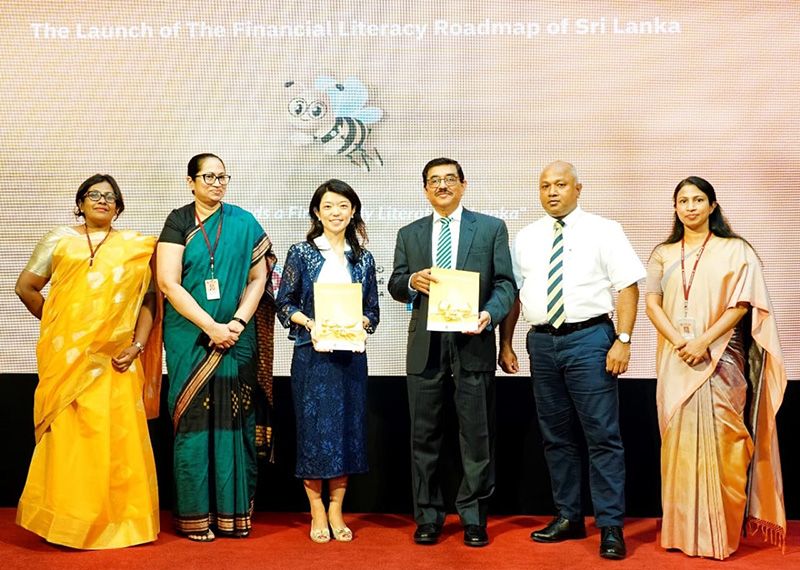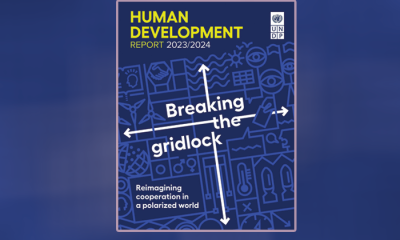Business
UNDP and IFC helping Sri Lanka to discover financial inclusion

By Sanath Nanayakkare
The barriers to financial inclusion have been a longtime problem in Sri Lanka as financial literacy has thus far been the prerogative of only the nation’s affluent customers.
However, eventually the Central Bank of Sri Lanka, 40 other national institutions, the public and private sector of the country along with the United Nations Development Programme (UNDP) and the International Finance Corporation (IFC) are now looking to help broaden financial literacy among the general public of the country to help them achieve financial freedom without allowing it to remain an exclusive right anymore.
This was revealed when the Financial Literacy Roadmap of Sri Lanka (2024-2028) was unveiled at the Central Bank of Sri Lanka on May 21st 2024.
The roadmap developed under the Financial Literacy and Capacity Building pillar of the National Financial Inclusion Strategy (NFIS) quite obviously incorporates sequenced actions proposed by the United Nations Development Programme and the International Finance Corporation (IFC) which were described by the Central Bank Governor Dr. Nandalal Weerasinghe as vital partners in rolling out the roadmap.
Introducing Mr. Beewise – the Sri Lankan Financial Literacy Expert in the first-ever financial inclusion roadmap for Sri Lanka, the multi-stakeholder knowledge tank promotes two aspects leading to financial inclusion in Sri Lanka; namely, knowledge and skills and attitude of the Sri Lankan general public by taking a cue from the busy bees.
“Bees, skilled in searching for and using resources reflect the value of knowledge to steer the day to day life prudently. The skills bees demonstrae in collecting nectar and producing honey reflect the practical skills needed in finance, budgeting, saving, investing and managing debt. And that is why we are referring to the analogue of the bee in this context,” said UNDP Resident Representative for Sri Lanka, Ms. Azusa Kubota.
“One of the mandates the Central Bank has been given is Financial Inclusion, and our endeavor towards this national agenda is strengthened and supported by the United Nations Development Programme (UNDP), the International Finance Corporation (IFC) and the members of the National Financial Inclusion Council,” said CBSL Governor Dr. Nandalal Weerasinghe.
He further said:
“Financially literate people make informed decisions about savings, investments and borrowings. They are more likely to understand the impact of the monetary policy decisions we take, and respond appropriately in line with monetary policy stance, contributing to effective monetary policy implementation.”
“Secondly, financially literate consumers will make informed choices and will demand efficient, transparent and responsible culture from the financial institutions rather than we need to regulate them all the time. Financial literacy will increase public trust in the financial system by supporting individuals to understand how the financial system works. This understanding is very important for the public to make their financial decisions. Further, financial consumers will be empowered to safeguard themselves against financial frauds which are growing with the new of technologies. More importantly, financial literacy can support reducing over-indebtedness and alleviating poverty.”
“Informed access to financial services enables people to manage their finances better, save for the future and invest in opportunities that benefit them. In the long run, this will reduce the burden on the government in terms of having to provide a social safety net, and will enable them to have better living conditions. Financially literate people can come out of poverty from their own financial decisions. A forward looking aspect of financial literacy advocates equipping the future generations with necessary financial capabilities to be financially resilient when they become adults. So, it is important for them to acquire financial literacy at school and university level.”
“Thus investing in financial literacy will be an investment in higher social and economic returns. So there are clear social and economic benefits out of financial literacy in any country. In this backdrop, the Central Bank of Sri Lanka is striving to improve the financial inclusion landscape of Sri Lanka through various initiatives.”
“The introduction of National Financial Inclusion strategy in 2021 with the help of all stakeholders by the Central Bank is currently in its implementation phase. That marks a significant milestone. The new CBSL Act entrusts the duty of promoting financial inclusion. The mandate has been given to the CBSL to formally promote financial inclusion. This road map provides an evidence based policy framework aimed at positively changing the financial behavior towards the betterment of the general public in Sri Lanka.
“Thirdly, creating of vigilant consumers is important to ensure consumer protection. As a whole, the implementation of this roadmap will be crucial in realizing the aspirations of financial inclusion in Sri Lanka,” he said.
Business
Beira Lake restoration, ‘a crucial urban environmental intervention’

Sri Lanka’s decision to invest Rs. 2.5 billion in restoring the heavily polluted Beira Lake marks one of the most significant urban environmental interventions in recent years, underscoring a growing recognition that ecological rehabilitation is also an economic imperative.
The multi-pronged project—covering the closure of illegal sewage discharge points, large-scale dredging, and the installation of aeration systems—is expected to not only revive aquatic life but also unlock commercial, tourism and real estate value in the heart of Colombo.
Officials say the initiative is designed to transform Beira Lake from a long-neglected liability into a productive urban asset.
A senior official from the Ministry of Environment told The Island Financial Review that untreated wastewater and illegal sewer connections had been the primary contributors to the lake’s degradation for decades. “Closing these illegal sewage points is the most critical intervention. Without that, any dredging or aeration would only offer temporary relief, the official said, adding that enforcement will be carried out in coordination with the Colombo Municipal Council (CMC) and other regulatory agencies.
From a business perspective, the clean-up is being viewed as a catalyst for urban regeneration. Urban Development Authority (UDA) sources noted that a healthier Beira Lake would significantly enhance the attractiveness of surrounding commercial developments, hospitality projects and public spaces. “Environmental remediation directly impacts land values and investor confidence. A clean, living lake changes the entire economic profile of the area, an UDA official said.
The dredging component of the project is aimed at removing decades of accumulated sludge, which has reduced water depth and contributed to foul odours and fish die-offs. According to officials involved in project planning, the dredged material will be disposed of following environmental guidelines to avoid secondary pollution risks—an issue that has undermined similar efforts in the past.
Meanwhile, the installation of modern aerators is expected to improve dissolved oxygen levels, a key requirement for sustaining fish and other aquatic organisms. “Restoring aquatic life is not just about biodiversity; it is about creating a water body that can safely support recreational activities and public engagement, a senior CMC engineer explained.
Economists point out that the Rs. 2.5 billion allocation, while substantial, should be seen against the long-term cost savings and revenue potential. Reduced public health risks, lower water treatment costs downstream, increased tourism activity and higher commercial footfall could deliver returns that far exceed the initial outlay.
By Ifham Nizam
Business
Expectation of positive Q3 corporate results jerks bourse to life

CSE activities kicked off on a negative note initially but later experienced some recovery yesterday because most investors were anticipating positive third quarter result shortly, market analysts said.
Amid those developments, the market indicated mixed reactions. The All Share Price Index went down by 4.13 points, while the S and P SL20 rose by 14.02 points. Turnover stood at Rs 5.17 billion with 11 crossings.
Top seven crossings were reported in Renuka Holdings where eight million shares crossed to the tune of Rs 324 million; its shares traded at Rs 40.50, Tokyo Cement one million shares crossed to the tune of Rs 113 million; its shares traded at Rs 113, Distilleries 1.85 million shares crossed for Rs 111 million; its shares traded at Rs 60, ACL Cables 500,000 shares crossed for Rs 51.5 million, its shares sold at Rs 103 Chevron Lubricants 250,000 shares crossed for Rs 47.5 million; its shares traded at Rs 190, Ambeon Capital 738600 shares crossed at Rs 40.50 each and Melstacope 150,000 shares crossed for Rs 27 million; its shares traded at Rs 180.
In the retail market top seven companies that mainly contributed to the turnover were; Colombo Dockyard Rs 1.26 billion (12 million shares traded), ACL Cables Rs 348 million (3.3 million shares traded), HNB (Non-Voting) Rs 152 million (425,000 shares traded), Hayleys Rs 109 million (507,000 shares traded), Tokyo Cement (Non-Voting) Rs 94 million (989,000 shares traded) Lanka Realty Investments Rs 80 million (1.6 million shares traded) and Sampath Bank Rs 77 million (498,000 shares traded). During the day 135 million share volumes changed hands in 38398 transactions.
It is said that manufacturing sector counters, especially Tokyo Cement and ACL Cables, performed well. Further, Colombo Dockyard became the most preferred share for investors. The Banking sector also performed well.
Browns Beach Hotels said that the company will delist from the CSE, having made arrangements with majority shareholders Melstacope and Aitken Spence Hotel Holdings to buy back shares from minority shareholders at an exit offer price of Rs 30.
Yesterday the rupee was quoted at Rs 309.75/85 to the US dollar in the spot market, from Rs 309.72/77 the previous day, having depreciated in recent weeks, dealers said, while bond yields were down.
A bond maturing on 15.05.2026 was quoted at 8.25/35 percent.
A bond maturing on 15.02.2028 was quoted at 9.00/10 percent, down from 9.05/10 percent.
A bond maturing on 15.12.2029 was quoted at 9.65/70 percent, up from 9.65/69 percent.
A bond maturing on 01.03.2030 was quoted at 9.72/75 percent, from 9.70/76 percent.
A bond maturing on 15.03.2031 was quoted at 9.95/10.00 percent, down from 10.00/10 percent.
A bond maturing on 01.10.2032 was quoted at 10.30/50 percent.
A bond maturing on 01.06.2033 was quoted at 10.72/75 percent, down from 10.70/80 percent.
A bond maturing on 15.06.2035 closed at 11.05/10 percent, down from 11.07/11 percent.
The telegraphic transfer rates for the American dollar were 306.2500 buying, 313.2500 selling; the British pound was 409.9898 buying, and 421.3080 selling, and the euro was 354.1773 buying, 365.5655 selling.
By Hiran H Senewiratne
Business
Ceylon Theatres and British Council present National Theatre Live’s ‘Hamlet’

Ceylon Theatres Limited, in partnership with British Council, is proud to present the first ever screening of National Theatre (NT) Live’s Hamlet starring Hiran Abeysekara in Asia. The first screening will happen at Regal Cinema in Dematagoda (Colombo 9) at 5:30 pm on Sunday, 25 January. Sri Lankan actor Hiran Abeysekera stars in the title role—the first Asian actor to play Hamlet in a National Theatre production.
For Sri Lankan audiences, this screening is both a celebration and a homecoming. It reflects the British Council’s long-standing commitment to nurturing creative talent, widening access to world-class culture, and building deep, people-to-people connections between Sri Lanka and the United Kingdom through theatre and the creative arts. To celebrate the inaugural screening, the British Council is inviting winners and runners-up of the All-Island Inter-School Shakespeare Drama Competition, alongside drama teachers and university actors, to attend the premiere.
Further details on screening dates, venues, and ticketing can be found at: https://ceylontheatres.com/ and on the British Council Instagram page https://www.instagram.com/britishcouncilsrilanka/ or call: 0766192370
-

 Editorial4 days ago
Editorial4 days agoIllusory rule of law
-

 News5 days ago
News5 days agoUNDP’s assessment confirms widespread economic fallout from Cyclone Ditwah
-

 Business7 days ago
Business7 days agoKoaloo.Fi and Stredge forge strategic partnership to offer businesses sustainable supply chain solutions
-

 Editorial5 days ago
Editorial5 days agoCrime and cops
-

 Features4 days ago
Features4 days agoDaydreams on a winter’s day
-

 Editorial6 days ago
Editorial6 days agoThe Chakka Clash
-

 Features4 days ago
Features4 days agoSurprise move of both the Minister and myself from Agriculture to Education
-

 Features3 days ago
Features3 days agoExtended mind thesis:A Buddhist perspective

























